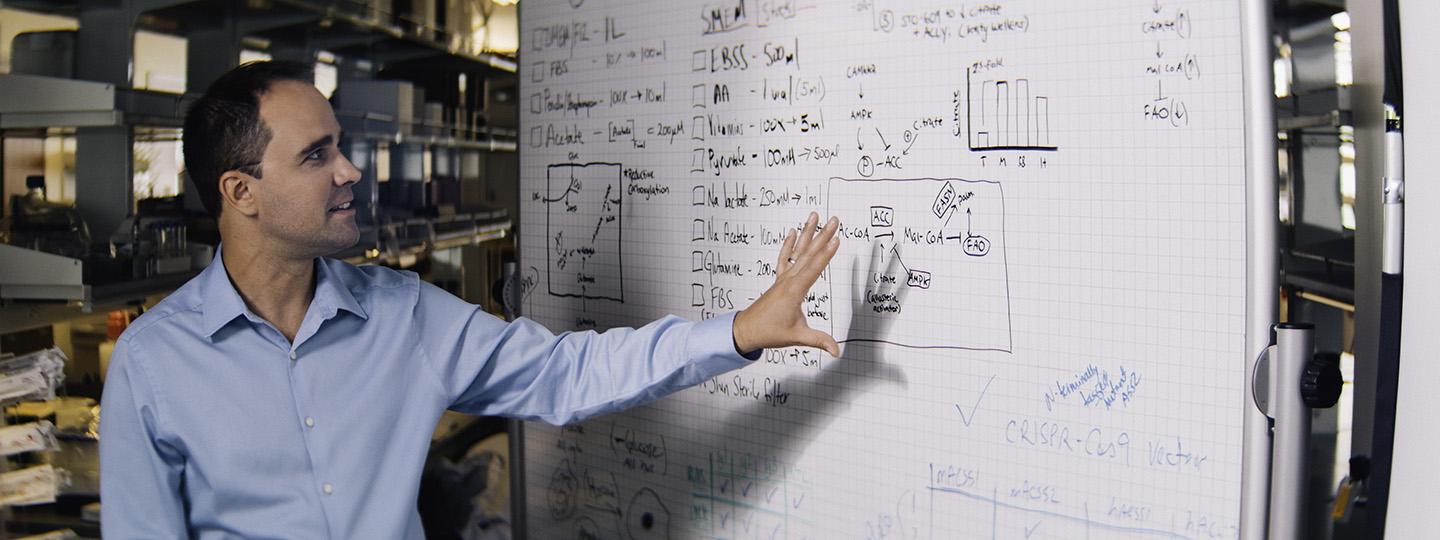New small molecule inhibitor impairs cancer growth in preclinical models by depriving malignant cells of a critical nutrient source

Credit: The Wistar Institute
PHILADELPHIA — (Jan. 7, 2021) — Scientists at The Wistar Institute characterized an inhibitor that targets acetate metabolism in cancer cells. Cancer cells use acetate metabolism to support tumor growth in conditions of low nutrient and oxygen availability. This molecule caused tumor growth inhibition and regression in preclinical studies, demonstrating the promise of this approach as a novel therapeutic strategy for solid tumors. Study results were published today in Cancer Research, a journal of the American Association for Cancer Research.
Highly proliferating cancer cells within a tumor often experience severe oxygen and nutrient deprivation. Over time, to satisfy their large metabolic demands for energy generation and synthesis of macromolecules, cancer cells adapt and evolve to survive and continue growing using different nutrient sources. The changes that accompany this metabolic rewiring represent a critical barrier to cancer treatment.
The laboratory of Zachary T. Schug, Ph.D., assistant professor in the Molecular & Cellular Oncogenesis Program at The Wistar Institute Cancer Center, studies the metabolic changes that arise during tumor progression to identify targets that can be exploited for new effective cancer treatments.
In particular, they focus on the role of acetate metabolism. They and others have identified acetate as an important alternative nutrient source for cancer cells and discovered that the ACSS2 enzyme, which converts acetate into acetyl-CoA, is crucial for tumor growth under nutrient stress conditions. Acetyl-CoA is an essential metabolite used by cancer cells for many fundamental cellular processes and to generate energy.
“We wanted to verify whether pharmacological inhibition of ACSS2 could prevent tumor growth and offer a significant therapeutic opportunity for cancers that rely on acetate for fuel,” said Schug, who is the lead author of the study.
In a collaboration with Joseph Salvino, Ph.D., professor in The Wistar Institute Cancer Center and a medicinal chemistry expert, Schug and colleagues synthesized and tested an inhibitor of the ACSS2 enzyme and showed that this molecule, called VY-3-135, is potent and highly specific in blocking the function of ACSS2 in breast cancer cell lines. Importantly, VY-3-135 treatment was able to inhibit acetate metabolism in tumors in vivo and caused marked inhibition of tumor growth in preclinical breast cancer models with high ACSS2 levels.
“Multiple studies have now shown that ACSS2 is essential in a wide variety of cancers, suggesting that acetate metabolism plays a near universal role in cancer and supports the promise of ACSS2 inhibitors for cancer treatment,” said Katelyn D. Miller, Ph.D., postdoctoral fellow in the Schug lab and first author of the study.
“We look forward to furthering our studies and creating safe, potent ACSS2 inhibitors for translation into the clinic,” added Schug.
###
Co-authors: Katherine Pniewski, Caroline E. Perry, Sara Papp, Joshua D. Shaffer, Jessica C. Casciano, Tomas M. Aramburu, Yellamelli V.V. Srikanth, Joel Cassel, Emmanuel Skordalakes, Andrew V. Kossenkov, and Joseph M. Salvino from Wistar; Jesse N.Velasco-Silva from University of Utah.
Work supported by: National Institutes of Health grants NIH Director’s New Innovator Award DP2 CA249950-01 and T32 CA009171; grants from the W.W. Smith Charitable Trust, Susan G. Komen®, and the V Foundation for Cancer Research. Support for The Wistar Institute facilities was provided by Cancer Center Support Grant P30 CA010815. The Wistar Proteomic and Metabolomic Facility is supported in part by NIH grants R50 CA221838 24 and S10 OD023586.
Publication information: Targeting of ACSS2 with a transition state mimetic inhibits triple negative breast cancer growth, Cancer Research (2021). Online publication.
The Wistar Institute is an international leader in biomedical research with special expertise in cancer research and vaccine development. Founded in 1892 as the first independent nonprofit biomedical research institute in the United States, Wistar has held the prestigious Cancer Center designation from the National Cancer Institute since 1972. The Institute works actively to ensure that research advances move from the laboratory to the clinic as quickly as possible. wistar.org.
Media Contact
Darien Sutton
[email protected]
Original Source
https:/
Related Journal Article
http://dx.





